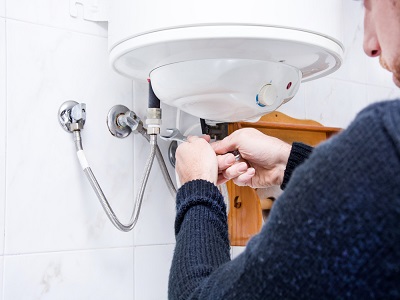
Nobody likes standing in their basement, ankle-deep in cold water as they wonder “why is my water heater leaking?” Or suddenly feeling water dripping on their head from the ceiling while lounging on the couch. The last thing you want is a busted water heater causing water damage to your carpet, photos, comic books, or other valuables.
That’s why we put together this guide, so you can see our top reasons for a water heater leaking – and avoid the dreaded flooded basement fiasco from a water heater burst. Read on for our most common culprits behind a leaking or busted water heater, and how to fix them. How can my water heater leak? Your guide to common causes of a faulty water heater
Water Heater Rust & Sediment Buildup
Water heaters are mostly made from steel. Steel is mostly iron, and yes, you guessed it right, iron rusts. An anode rod is a protection that water heaters use to prevent rusting. However, over time, your anode could wear down and fail, which can cause your heater to leak from its top anode. We recommend that you call a plumber if your hot tap water becomes a gross, rusty brown color.
Hard water runs through most of the water heaters in many homes. Hard water contains small amounts of minerals that can settle in the tank of your heater. This can cause a layer of sediment that prevents water from reaching the burner.
What does this all mean? This means it takes longer for water to heat, which can lead to overheating, general degradation, and most importantly, leaks from your water heater’s base. This problem can be avoided by draining the water and flushing out sediment every year. But if you don’t, you can be expected to face some of the problems listed below.
A Drain Valve Leak
A leaking drain valve could be the reason your water heater is leaking. A flooded basement could occur if the drain valve is damaged. To remove sediment from hot water tanks, drain valves are installed. The leak in your water heater could be caused by a loose valve.
Leakage in an Internal Tank
An internal tank leak is the most common reason your water heater is leaking from its base. Your water heater could be leaking because of internal damage to its tank. It could be that your tank has been contaminated with sediment for a long time. This could lead to corrosion and cracking of the tank shell. To check for serious internal problems, inspect the tank from the outside. In most cases, replacing the water heater will be the only way to fix it.
Air Pressure
When the outside water pressure is too high, or the temperature rises too much, excess air pressure can build up in your water heater’s tank. These problems can be avoided by setting your water heater at 120-125 degrees.
We recommend that you keep an eye on the temperature and pressure relief valve of your water heater, called a temperature control valve. It is located on the tank’s top or side and releases the heater’s tank’s pressure when needed. If the valve does not leak water, it is best to replace it immediately. Tip: Avoid replacing the valve with a plastic one if you can. They are cheap and will soon break again.
Time
Your water heater could also be at risk of aging. Hot water heaters can last between 8 and 10 years. Basic leaks can occur at the end of their useful life. These potential leaks can be caused by corrosion, sediment damage over years, or the inevitable damage of aging.
Call Blue Ribbon Plumbing LLC now if you need help with your water heater or your home’s plumbing system.
Like our Facebook page for more great info about plumbers.
Blue Ribbon Plumbing LLC
4201 Carolina Exchange Drive Suite 202
Myrtle Beach, SC 29579
(843) 267-9733
https://www.blueribbonplumbingmb.com/
Serving all of Horry County including Myrtle Beach, North Myrtle Beach, Little River, Murrells Inlet/Garden City, Surfside Beach, Carolina Forest/Forestbrook, Conway/Aynor
No comments:
Post a Comment